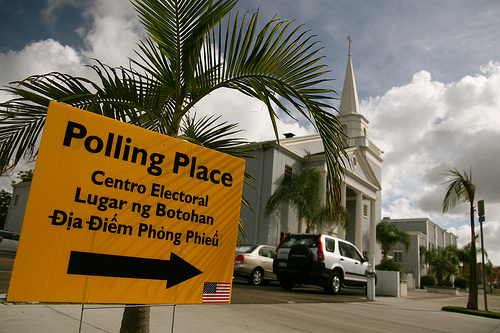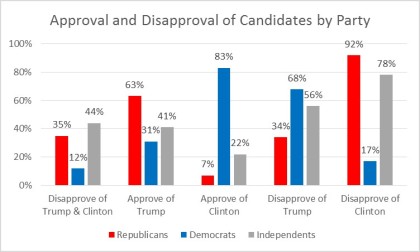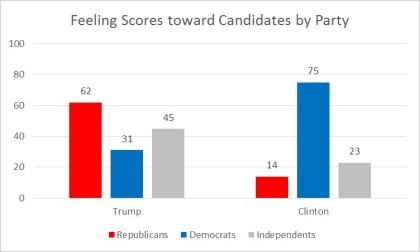

Editor’s Note: Today, Joshua Wu wraps up his most recent series (his description below). If you’re craving more data analysis, though, don’t be dismayed. Josh plans to continue blogging at ESN later this academic year, with further data analysis on political and civic topics of interest to evangelicals. Stay tuned for more! The team at ESN is deeply grateful to Josh for sharing for his thoughtful analyses of this US election season so far.
Author’s note: During the US election season, we will be bombarded with a chorus if not cacophony of political coverage, punditry, and even misrepresentation of the presidential campaign. To help us navigate this noisy time, I will be presenting a series of empirical snapshots on how evangelical Christians perceive the two presumptive nominees for president. By “letting the data speak,” I will present a nonpartisan analysis of the social and political attitudes of our fellow Christians. While the findings should challenge our preconceptions and convictions, it is not an endorsement or critique of either candidate. Instead, my hope is that it spurs greater conversation and discussion about how our faith can and should translate into our perceptions and participation in the presidential election. See the first post in the series, on how to read the polls, here. Read the second post, on what predicts Evangelical approval or disapproval of Trump, here. For the third post, on what predicts Evangelical approval or disapproval of Clinton, click here.
This US presidential election, it seems evangelicals and Christians are choosing between what prominent evangelical leaders have framed as the “lesser of two evils.” But do most evangelicals really have negative attitudes toward both Donald Trump and Hilary Clinton?
Using feeling thermometer data from the National Election Study I used previously to analyze evangelicals’ perceptions of Trump and Clinton, I examine the extent to which evangelicals perceive the candidates as “good” and “evil,” using approval and disapproval respectively as the scope of the empirical analysis.
I find strong statistical evidence against the “lesser of two evils” narrative. Few evangelicals disapprove of both candidates. Instead, most are favorable to one candidate and disapprove of the other. Thus, a better analogy to describe evangelicals’ choice this election may be a choice between a “good” candidate they approve of and an “evil” candidate they disapprove of.
First I calculate the percentage of evangelicals who disapprove of both Trump and Clinton (give both candidates a score less than 50), who approve of one candidate and disapprove of the other (giving one candidate a score greater than 50 and the other less than 50), and who approve of both candidates (give both candidates a score greater than 50).
If the “lesser of two evils” analogy was an empirically valid description of evangelicals’ attitudes, most evangelicals would disapprove of both Trump and Clinton. However, as the chart below shows, only 27% of evangelicals disapprove of both candidates. Instead, the majority of evangelicals (59%) approve of one candidate and disapprove of the other.
I find more evidence against the “lesser of two evils” narrative when disaggregating approval and disapproval by evangelicals’ party identification. Among evangelical Republicans, only 35% disapprove of both candidates; similarly, only 12% of evangelical Democrats and 44% of evangelical Independents disapprove of both candidates.
Moreover, patterns of approval and disapproval of candidates seem to be predicted by party identification. 63% of evangelical Republicans approve of Trump but only 34% disapprove. Similarly, 83% of evangelical Democrats approve of Clinton but only 17% disapprove. Evangelicals are also more likely to disapprove of the opposition party candidate. 68% of evangelical Democrats disapprove of Trump while 92% of evangelical Republicans disapprove of Clinton.
Finally, I compare feeling scores towards the candidates by party to identify the extent to which evangelicals may have divergent attitudes toward the two candidates. There are significant differences across the partisanship divide. Evangelical Republicans approve of Trump with an average feeling score of 62 but strongly disapprove of Clinton with a feeling score of 14. By contrast, evangelical Democrats disapprove of Trump with an average feeling score of 31 and strongly approve of Clinton with an average score of 75. This suggests that most evangelicals approve of their party’s “good” candidate and disapprove of the opposite party’s “evil” candidate.
While the “lesser of two evils” appear to be an oft-repeated frame for this election, it is not supported by empirical evidence. Only a minority of evangelicals disapprove of both candidates. Evangelicals are likely to approve of their party’s candidate and disapprove of the other party’s candidate; independents are more likely to disapprove of both candidates.
Therefore, for the majority of evangelicals, a more accurate description of their choice this presidential election season is not a dilemma of choosing between the “lesser of two evils.” This suggests that most evangelicals approve of their party’s candidate, whom they see as a “good” political choice, and disapprove of the opposite party’s candidate, whom they see as an unsatisfactory or perhaps even “evil” political choice.
Joshua Su-Ya Wu is a husband, father, pastor’s kid, and social scientist seeking to faithfully reflect Christ in all aspects of his life. He has a doctorate in Political Science from The Ohio State University, works in analytics and data science, and writes about data analytics at Reasonable Research and the intersection of faith and culture at Stuff I Didn’t Learn in Church. He currently lives in Rochester New York with his wife and two kids, and can be reached on Linkedin or on Facebook



I am not sure I fully agree with your analysis, because it does not take history into account. Historically, I think you would find the vast majority of voters supported their candidate, thinking him or her to be ‘good’ on whatever issues were of importance to them. What is unique this year is that 35% of evangelicals have a negative impression of both! While not a majority, it is over 1/3 – a huge number – which certainly explains why we hear so many pastors saying it. If they are a representative sample (which cannot be assumed) there are an equal number saying both are bad as there are supporting one candidate or the other. That is what is highly unusual. More importantly, many are saying the candidates are ‘bad’ based not on policy, but ethics. As one commentator speaking to Fox News about the ethical issue recently said, it is not a matter of deciding which gets a D- and which an F, but how did we as a country get to this point?
Hi Gerry, thanks for your thoughtful comments!
First, wondering where you got the 35% number? As I show above, I find that only 27% of evangelicals disapprove of both. This is from arguably the most best national sample out there .The National Election Study is the gold standard for both policy and academic studies, and thus, as good of a representative sample as we can get. But regardless if the “true” percentage is closer to 27% or 35%, it is still a minority. Without having a chance to look at historical numbers, i would say that even looking at last year, the minority of evangelicals similarly disapproved of Romney and Obama in 2012.
The point you raise about the differences between what pastors are saying and what “lay” evangelicals are saying is one of the points of my piece. I would agree w/ you that most pastors do disagree of both candidates. I would contend however that most evangelicals do not disapprove of both (as the survey data shows). So this is a case where there is a discrepancy between what pastors are saying versus what lay-evangelicals/Christians are saying.
Regarding the distinction between policy and ethical considerations. I agree that most people who use the “lesser of two evils” frame is doing so out from an ethical/moral basis. The data does not directly measure that (would be hard to really measure). However, if someone finds a candidate to be morally lacking, it should also he/she should also disapprove of the candidate. My analysis is based on examination of these approval/disapproval scores which is an imperfect but probably “best” way to measure how “ethically” candidates are.
Fourth, while I agree that the question of “how we got here is interesting,” that was not the scope of this article.
Finally, one of the goals of the series is to hopefully challenge us to have a more “comprehensive” understanding of how our fellow evangelicals/Christians think beyond the “non-representative” Christians we are in contact with.
Thanks again for your comments!
Hi Joshua,
Oops, the 35% was from grabbing the wrong number as I looked from my response back to the article for the details – that is the number for Republicans only, one paragraph below where you reported the overall – but it stood out at the beginning of a line in the online version. I think the mention of pastors was in a previous piece in the series, not this one, so I was just trying to clarify. My other comments were not in any way a critique on your piece, but trying to take the discussion to the next level. Thanks for listening and responding.
Hi Gerry,
Thanks again for your comments and feedback–I appreciate it!
I think one of the broader points you bring up, to move the conversation beyond the number/data, is great.
I was actually surprised at how few evangelicals disapproved of both candidates given the chorus of “lesser of two evils” hand-wringing I was reading. That brings up if those who are “speaking” for the evangelical community are in fact a vocal minority, or if in fact there are many evangelical communities that have widely divergent views on social and political issues. So depending on which evangelical community you are in, you and most of your/our peers will have one opinion, but when we aggregate all evangelicals together, we get a more complicated picture.
Again, thanks for taking the time to engage the article!